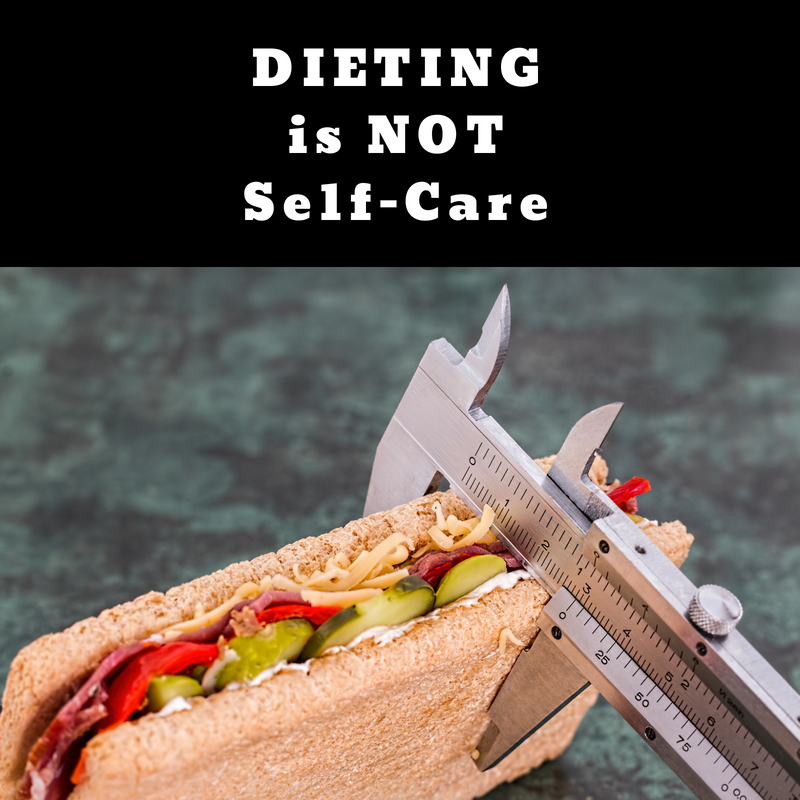Read the blog
Dieting is NOT Self-care
 One thing that gets my angry inner goat going like nothing else is the constant insistence out there in the world that dieting to lose weight is the equivalent of “eating healthy” or “becoming healthy.”
One thing that gets my angry inner goat going like nothing else is the constant insistence out there in the world that dieting to lose weight is the equivalent of “eating healthy” or “becoming healthy.”
As a former dieter, and someone who treats long-term chronic dieters and weight-cyclers in my private practice, I can tell you that while this might start out as the intention, it almost never ends that way.
And while some people who do make positive changes in their eating habits may experience some weight loss, there is little evidence that eating “healthier” will absolutely lead to significant long-term weight loss for the majority of people, or turn large people into small people. This is why people tend to resort to diets that involve calorie deprivation to achieve weight loss.
I want to point out, however, that while a nutritionally-dense diet may not lead to weight loss, it can certainly help to improve your health (but is not the whole picture of “health”) and is worth pursuing if that is what you want to do.
But let’s be honest: most diets are not about getting healthier. They are about losing weight, which we are told will automatically make us healthier. Unfortunately, this is not always true.
When I “successfully” dieted for 16 years, at my thinnest and most restrictive point, I ate few fruits and vegetables (“waste of calories”), ignored my hunger for so long I wanted to cry at times, then secretly binged when I couldn’t take it anymore, and ate a mostly monotonous diet of “safe” foods. I fought a psychological war with the scale daily that often resulted in defeat for me, no matter what the number said.
This was not pursuit of health in any way. These were the things I needed to do to maintain weight loss, because simply eating healthfully didn’t.
Many of my clients arrive in my practice with some version of the same story. Their diets may have started as an attempt to eat “healthy” (albeit focused completely on weight as the main measure of health) but they ended up in a never-ending cycle of restriction and binge-eating, feelings of shame around their bodies and failure to follow a diet, and often higher weights than they started at. They are also very confused about how to eat in a way that actually supports health and well-being without feeling deprived (which is why they have come to me).
Let me tell you this: it isn’t that hard to have a balanced, nutritionally adequate diet when you feel relaxed around food. Behavior change can be challenging, but it is much less so when you see body shame for what it is and leave fatphobia behind. That is why dieting isn’t really about health – because diets involve intense shame around your current body and a desire to make it something it isn’t.
When changes feel really hard or unsustainable (and sometimes make you want to cry), consider that you might actually be on a diet. If your diet changes are supposed to produce a tangible change in the appearance of your body, then you are on a diet.
And if you’re worried about health, know that a non-diet approach actually will support making positive changes for health.
In the meantime: This article is a great example of how diseases like diabetes are more likely related to nutritionally inadequate diets than higher weights. It makes so much sense when we look at how long-term yo-yo dieting may be linked to development of diabetes as well as weight gain. Again, “successful” deprivation does not equal health!
Subscribe and get my free guide:
Why you overeat …and what to do about it.
Click here if you just want my newsletter!
Comments Off on Dieting is NOT Self-care